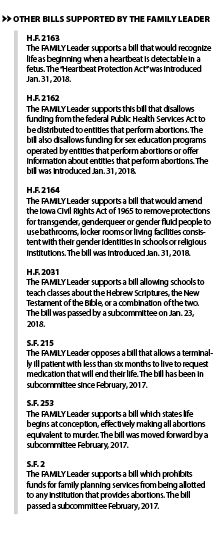Proposed bill would allow biblical literacy classes in public schools

family leader
February 5, 2018
Professors of religion and history from all of Iowa’s major universities are condemning a state bill which would allow “biblical literacy” classes into Iowa public high schools.
The bill, titled House File 2031, says schools “may offer and teach courses studying in both “the Hebrew scriptures” and “The New Testament of the Bible.”
“This country was founded by God-fearing, Bible using people,” said Iowa Rep. Larry Sheets, R-80, one of the bill’s architects. “George Washington said it himself, that this country can only work if people are righteous.”
Sheets believes the Bible has influenced this country and the world so much that children need to understand its contents to have an efficient education.
“Look at the dollar bill,” Sheets said. “Look at the Supreme Court building. Look at the Library of Congress.”
He was referring to the religious symbolisms at all of these landmarks: The motto “In God We Trust” on American currency, a depiction of Moses’ tablets on the doors of the Supreme Court and a verse from Psalms on the walls of the Library of Congress, respectively.
Confucius, the prophet Mohammed, Hammurabi, Charlemagne and Napoleon are also depicted in the Supreme Court building, among others. The phrase “In God We Trust” began appearing on all U.S. currency after a resolution was passed under President Dwight D. Eisenhower during the Cold War.
“Truly righteous people only need ten commandments,” Sheets said. “If people aren’t Christian, I’m sure they can be good neighbors, but I don’t think they can be good in the divine sense.”
However, Sheets says he is opposed to biased instruction of biblical literacy.
“This bill isn’t trying to convert anyone, it’s looking at how the Christian faith inspired this country,” Sheets said. “The Bible heavily influenced the Declaration of Independence and the Constitution.”
Professors Speak Out
“The entire idea of the Constitution is anti-Bible,” said Hector Avalos, Iowa State professor of philosophy and religious studies. “It starts out ‘We the people,’ so we’re the ones deciding the laws. There is a fundamental difference between biblical law and democratic law.”
The difference is that under biblical law, such as the Ten Commandments, laws aren’t up for amendment or debate. Democratic laws, however, are chosen by people.
Avalos also pointed out a letter written by Thomas Jefferson, to Thomas Cooper Monticello in 1814. In the letter, Jefferson offers an answer as to why biblical laws should not be used for common laws.
“In answer to [the] question why the Ten Commandments should not now be a part of the common law of England?” Jefferson wrote. “We may say they are not because they never were made so by legislative authority.”
Avalos is a biblical scholar fluent in Greek, Hebrew and Aramaic translations. He advises everybody to read the Bible and study the literature, but believes the bill wouldn’t be an efficient way to provide a religious education.
“The bill would allow virtually anyone to indoctrinate without any peer review by professional biblical scholars,” Avalos said. “It opens a back door to return the Bible to a privileged religious status in public schools.”
Criticism of HF 2031, the proposed bill, comes from lobbying groups and academics alike. Avalos co-authored a joint statement with professors from the University of Iowa and the University of Northern Iowa, condemning the bill.
Avalos is worried because the bill lacks any specific academic requirements for teachers to administer the course. The bill only states it would be taught as a social studies elective.
“It would certainly help to require teachers to have academic training in biblical studies before being allowed to teach such courses,” Avalos said. “[But] most teachers in primary and secondary schools will not have that sort of training.”
Legislators and Lobbyists are Split
According to Rep. Dean Fisher, R-72, another architect of HF 2031, the lack of specific requirements in the bill is no cause for worry.
“We’re leaving decisions like that to be made by the Department of Education,” Fisher said.
He continued, “The idea behind this course is to teach the major themes of the Bible and not give in to the minutiae of each viewpoint. The class should teach themes that transcend individual interpretations.”
To Connie Ryan, executive director of the rights-focused lobbying group Interfaith Alliance, the bill shouldn’t be passed on principle.
“The bill is inappropriate for Iowa’s public education system,” Ryan said. “It inserts religion into public schools, and it’s just unnecessary.”
HF 2031 is supported by a different lobbying group, The FAMiLY Leader (TFL). The Daily reached out to multiple advocates for TFL, but all questions were directed to Director of Communications Drew Zahn.
TFL is a conservative lobbying group that wants more Christian representation in Iowa schools as well as the government. They’ve shown support for other recent bills, including one which would allow schools and businesses to prohibit transgender people’s access to certain restrooms.
“The Bible has undeniably been an enormous influence on our American and World history and culture, including art and literature,” Zahn said in an email. “Yet too few of our children are being exposed to the Bible, so this proposed course aims to rectify that for those that desire to learn more.”
“The Bible has had a uniquely prominent role in shaping Western civilization and American culture. That makes it uniquely valuable in an American education,” said Zahn.
Zahn declined to participate in a phone interview.
Avalos agrees the Bible has had enormous influence on history, but insists some people have a one-sided way of observing that influence.
“Most people assume whatever Christianity offered to society was good,” Avalos said. “Look at what Christians did to the Native Americans. Was the Bible’s influence beneficial to them?”
Ryan contends making a high school course which specifically analyzes the Bible would be excessive.
“Schools already talk about religion in context and in world literature classes,” Ryan pointed out. “[In these classes] it is not the sole text being used and it doesn’t promote any theology. A class focused on the Bible is just inappropriate to the setting.”
Sheets and another HF 2031 legislator, Skyler Wheeler, R-04, introduced bill HF 480 in 2017. This bill would require public schools to add theological content to their curriculum for “instruction relating to evolution, the origins of life, global warming or human cloning.”
The Daily attempted to contact Wheeler for an interview, but received no responses.
Rep. Mary Mascher, D-86, was part of a subcommittee which advanced HF 2031 to be seen in front of a full committee. However, she also called for future amendments to the bill which would offer similar instruction in the Quran, Talmud and other major religious texts.
Wheeler opposed this idea.
“The Bible is different than the Quran,” Wheeler told the Des Moines Register. He claimed that texts like the Quran haven’t had a comparable impact on American culture or history, and therefore shouldn’t be included in the bill.
Note: An edit was made to correct a grammatical error Feb. 6, 2017.






